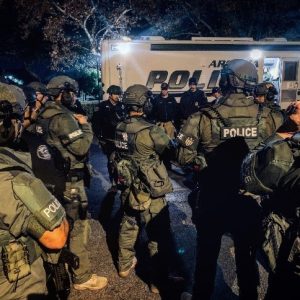 View Winners →
View Winners → 
A judge Friday rejected a resentencing bid by one of four men convicted of a deadly 2008 attack on a woman in a Century City parking garage in a crime that was masterminded by her estranged husband, who co-owned a gold trading company and was subsequently sent to death row for her murder.
Superior Court Judge Eleanor J. Hunter found that Jose Luis Moya was legally ineligible for resentencing under a state law that affects the convictions and sentences of defendants in some murder cases.
Moya, now 61, and co-defendants Gabriel Jay Marquez, now 53, and Marquez’s nephew, Steven Vicente Simmons, now 33, are serving life-prison terms without the possibility of parole for the July 28, 2008, killing of Pamela Fayed, who was stabbed 13 times as she approached her SUV in a parking garage at Watt Plaza in Century City on July 28, 2008.
The 44-year-old woman and her estranged husband, James Michael Fayed, had just met with their criminal attorneys as a result of an investigation into the couple’s gold-trading business.
James Fayed, now 59, was tried separately and convicted of her murder. He was sentenced to death in November 2011.
The California Supreme Court upheld Fayed’s conviction and death sentence in an April 2020 ruling, in which Supreme Court Justice Ming Chin noted that Fayed’s initial hesitation to talk to a cellmate while in federal custody “gave way to extended diatribes of how Moya and others bungled previous attempts to kill Pamela and how defendant did not want to be worried that Moya would turn on him” and that Fayed admitted he would have killed his wife himself but would never “get away with it.”
In a February 2018 ruling in the case of Moya, Marquez and Simmons, a three-justice panel from California’s 2nd District Court of Appeal wrote that “Marquez was the link between Moya, who was paid to kill Pamela, and Simmons, who the evidence showed probably did the actual killing.”
“Marquez had a relationship with Moya’s niece and was related to Simmons. The jury could reasonably infer from the cell phone evidence that Marquez also traveled to the Century City area at the same time as Moya and Simmons and left at the same time, just after the killing,” according to that ruling.
Moya, Marquez and Simmons were convicted of first-degree murder and conspiracy to commit murder, with a downtown Los Angeles jury finding true the special-circumstance allegation of murder while lying in wait.
Jurors also found true the special-circumstance allegation of murder for financial gain against Moya, who had worked as a ranch hand for the woman’s estranged husband at his Ventura County ranch.
Then-Superior Court Judge Kathleen Kennedy — who presided over the trial in downtown LA for Moya, Marquez and Simmons along with Fayed’s subsequent trial — called it a “most disturbing case because of its planning and sophistication — even though it was not carried out in a sophisticated manner.”
She noted that Fayed was nearby as his wife was being “brutally and brazenly murdered,” and that others reacted to the woman’s blood-curdling screams while surveillance video showed him outside the parking garage “totally immune to the screams of his wife, the mother of his child.”
The prosecution contended that Fayed contracted the hit on his estranged wife because he believed the mother of two would cooperate with federal investigators and because she could have ended up with half of the couple’s marital assets in a divorce.
Prosecutors also alleged that Fayed planned to arrange more killings from behind bars in hopes of eliminating the people who committed the crime for him.









































































































